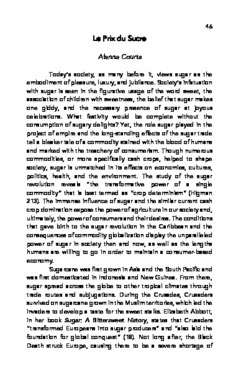| dc.contributor.author | Courts, Alanna | |
| dc.date.accessioned | 2016-06-12T19:13:53Z | |
| dc.date.accessioned | 2021-04-14T14:29:53Z | |
| dc.date.available | 2016-06-12T19:13:53Z | |
| dc.date.available | 2021-04-14T14:29:53Z | |
| dc.date.issued | 2016 | |
| dc.identifier.uri | https://hdl.handle.net/11244.46/93 | |
| dc.description | Copyright © 2016, The Honors Undergraduate Research Journal, University of Oklahoma. All rights revert to authors. | en_US |
| dc.description.abstract | Today’s society, as many before it, views sugar as the
embodiment of pleasure, luxury, and jubilance. Society’s infatuation
with sugar is seen in the figurative usage of the word sweet, the
association of children with sweetness, the belief that sugar makes
one giddy, and the necessary presence of sugar at joyous
celebrations. What festivity would be complete without the
consumption of sugary delights? Yet, the role sugar played in the
project of empire and the long-standing effects of the sugar trade
tell a bleaker tale of a commodity stained with the blood of humans
and marked with the treachery of consumerism. Though numerous
commodities, or more specifically cash crops, helped to shape
society, sugar is unmatched in its effects on economies, cultures,
politics, health, and the environment. The study of the sugar
revolution reveals “the transformative power of a single
commodity” that is best termed as “crop determinism” (Higman
213). The immense influence of sugar and the similar current cash
crop domination expose the power of agriculture in our society and,
ultimately, the power of consumers and their desires. The conditions
that gave birth to the sugar revolution in the Caribbean and the
consequences of commodity globalization display the unparalleled
power of sugar in society then and now, as well as the lengths
humans are willing to go in order to maintain a consumer-based
economy. | en_US |
| dc.description.sponsorship | The Honors Undergraduate Research Journal (THURJ) is a publication of the Joe C. and Carole Kerr McClendon Honors College at the University of Oklahoma. The views expressed in THURJ are solely those of the contributors and should not be attributed to the Editorial Staff, the Honors College, or the University of Oklahoma. | en_US |
| dc.language.iso | en_US | en_US |
| dc.relation.ispartofseries | THURJ: The Honors Undergraduate Research Journal;Volume 15 | |
| dc.rights | Attribution-NonCommercial-ShareAlike 3.0 United States | * |
| dc.rights.uri | https://creativecommons.org/licenses/by-nc-sa/3.0/us/ | * |
| dc.subject | The Sugar Revolution | en_US |
| dc.subject | Commodity Globalization | en_US |
| dc.subject | Consumer-based Economy | en_US |
| dc.title | Le Prix du Sucre | en_US |
| dc.type | Article | en_US |
| dc.description.undergraduate | undergraduate | |

